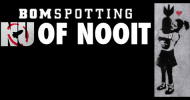
Zijn reeks TV Nation - een kleine vijftien jaar geleden - gaf Michael Moore de tegelijk dankbare en ondankbare rol van verwoorder van de blijvende onvrede die de economische ordening hoort op te roepen. Sicko heb ik - ironischerwijze - moeten missen omdat films en dubbelzien niet samengaan.
Democracy Now! interviewde hem over zijn nieuwe, Capitalism: a love story.
HIer in het interview raakt hij aan waar het om gaat:
There’s the larger crime, though, of course, of how the pie is divided in this country. And the fact that one guy can come to the table and take nine slices of that pie and leave one slice for everyone else at the table to fight over, that is criminal. That is offensive on so many levels. If we say we believe in democracy, it’s offensive on that level. If you have any kind of moral or ethical code that you live by, whether it’s because of your religion or your own spirituality or just because you know right from wrong, anyone, anyone over seven years old, maybe even a few five- and six-year-olds, know that if one guy takes nine slices of the pie and leaves one slice for everybody else, that’s just inherently wrong. And we allow that to happen.
En dan gaat het mis, zoals het in de Verenigde Staten blijkbaar standaard mis gaat met al die mensen die zich christen noemen: als je maar in de hemel komt. Het leven zelf is door deze mensen zozeer afgeschreven dat hun christendom daadwerkelijk slechts een belofte van pie in the sky is.
Hoeveel duidelijkheid heeft men nodig?
Michael Moore voelt blijkens het vorige citaat wel aan hoe het zit, maar kan niet loskomen van het idee van een jenseitiges Koninkrijk Gods:
AMY GOODMAN: There is a section of your film on religion that is very important, I think will speak to a lot of people, “Christianity and Capitalism,” and the film that you use to illustrate this, Jesus of Nazareth.
MICHAEL MOORE: Well, you know, this is the first I’ve ever really talked about this in any of my films, because I’m kind of loath to talk about religion. I think it’s a private matter, and I’m sick of hearing everybody discuss it or shove it down our throats. I’m not a proselytizer. I was raised Catholic. I am a Catholic. I have a lot of problems with the institution known as the Catholic Church, all the obvious ones that we don’t need to go into right now.
But the lessons that I was taught as a child, I’ve always felt were very good lessons, that we would be judged by how we treat the least among us; that the first shall be last, the last shall be first; that the rich man is going to have a very hard time getting into heaven. And one day, when someone asked Jesus, like, what’s the password to get in through the pearly gates, and JC said, “Well, actually, I’ll give it to you,” and he said, “This is what you’ve got to do. We’re going to ask you a series of questions when you get up there, and these are the questions. When I was hungry, did you feed me? When I was homeless, did you give me shelter? When I was sick, did you provide aid and comfort? When I was in prison, did you come visit me? If you did any of these things for the people who are the least among us, who have the least, then that means you did it for me, and you can now enter. But if you are thinking that you’re going to—if you’re going to live your life making as much money as you can and then using that money for your own purposes, for your own pleasure and enjoyment, and not share it with others, not help others, then, I’m sorry, that’s not going to—that’s not going to work.”
Now, I’m being a little facetious here, because, you know, the whole issue of the afterlife, I think, has always been used by those in power to get us just thinking about the reward that’s some place off in the distant future, like when we’re dead, so for right now just go ahead and, you know, suffer through whatever it is you’re suffering through.
But I believe—I’m just, you know, so tired of hearing this term, this idea that Christianity is somehow—or this is a Christian nation or whatever, and it’s like—well, first of all, there shouldn’t be any kind of a religious nation. But it’s also a lie, too, because what part of what Jesus said relates to what we’re doing now? I mean, I can’t see this guy, if he was here, you know, being part of a hedge fund. I can’t see, you know, Jesus trying to claw his way into the one percent so he can punk on the rest of the people. You know, I just—these people say they believe in him; I wish they actually would, frankly, because we’d be living in a kinder and gentler society.
So, in the film, I appropriate a piece of film from Franco Zeffirelli’s Jesus of Nazareth, and I imagine if they actually think that Jesus would approve of what they’re doing, what would Jesus sound like if he were a capitalist? And so, I—you know, our editor, actually, dubbed in his voice into Jesus’ mouth, and he goes around preaching the capitalist bible. Yes, it gets a lot of laughs, and it’s also—I’m waiting for the onslaught of believers who are not going to appreciate what I’m doing here.
But, you know, I go to see the priest who married my wife and I, and I go to see the priest who married my sister and her husband. And every priest I go to—and those are just the first two I start with, people I know. I didn’t go looking for, you know, socialist priests. And they both just rail against capitalism as a sin. It’s evil, it’s destructive, it’s contrary to what’s in the Bible. It’s contrary to all the major religions, not just Christianity, but Judaism, Buddhism, Islam, the church of Bill Maher. Whatever you believe in or don’t believe in, it’s just contrary to what—to what we know right and wrong is.
Laten we een kijkje nemen in de door hem genoemde (en naar ik aanneem gefilmde) bakkerij.



Geen opmerkingen:
Een reactie posten